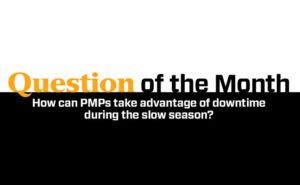
GRAPHIC: PMP STAFF
We asked Pest Management Professional’s columnists and editorial advisory board members about how PMPs can take advantage of downtime during the slow season. Here are some of their responses from our February 2025 print edition.
Greg Baumann: “Ask yourself why you have a slow season and set up a program to fill the schedule next year. For instance, if your services are 95 percent residential, develop a plan to get more commercial, which is year-round work.”
Michael Broder: “The slow season is the perfect time to test new equipment and products to see whether they can work for your day-to-day services.”

Jerry Schappert, ACE
Dennis Jenkins: “The winter is a great time to evaluate your routes and prepare for spring. You need room in the routes for the spring increase in business. It also is a time to get more efficient with your routes. If you don’t prepare for an increase in business, you will not be ready and able to grow as much.”
Jerry Schappert, ACE: “It’s a great time to service equipment and get all those nagging little issues taken care of that you have been neglecting because you’ve been too busy. Also, it’s time to hit the books, learn and grow so you’re an even better PMP come spring.”

Desiree Straubinger, BCE
Desiree Straubinger, BCE: “The slow season is a great time to take care of some items that fall behind during the busy summer, such as perform preventive maintenance at client properties, anticipating insect arrival in the spring and summer. Update commercial customer properties with freshly numbered stations and wall placards. Complete continuing education unit (CEU) training for licenses and certificates. Detail and clean vehicles inside and out. Organize storage areas in service buildings and vehicles. Rest!”
Eric Scherzinger: “Take advantage of the downtime. Review the previous year, what went well, what went wrong and what you can do better this year. Roll out any new procedures.

Eric Scherzinger
Provide extra training to get ready for the busy season. There are so many things to do while it slows down a little bit; take full advantage of it!”
Pete Schopen: “Calling canceled clients should be first on the list. Don’t give up on them, even if you have reached out to them before. Also, call your one-time customers and explain your recurring services to them. Email current clients and cross-sell to ensure they know what you offer. Give your technicians scripts and have them help make the phone calls.”
Foster Brusca: “The slow season offers the ideal opportunity to refine your skills and expand your expertise as a pest management professional. Use this time to invest in continuous learning, whether through online courses or attending in-person conferences. Doing so will enhance your skills, deepen your knowledge, and help you maintain a competitive edge in the pest control industry.”

Mark Sheperdigian
Kurt Scherzinger: “Take time to repair all your equipment and make sure everything is in working order for the upcoming season.”
Mark Sheperdigian: “Do you have extra time? Maybe now’s the time to get that certification you have been meaning to get. It could be another category for your Certified Pesticide Applicator license, or you could sign up for a prep class and get your Associate Certified Entomologist (ACE) certification through the Entomological Society of America.”
Doug Foster: “Winter is the perfect time to plan and schedule training for both technicians and office personnel. As owners, we need to plan for the upcoming season. What went wrong? What went right? What can be improved? Equipment and vehicle maintenance takes a priority so when spring arrives, you are ready to roll.”

Sheri Spencer Bachman
Sheri Spencer Bachman: “Plan for growth by working on your business strategy; reassessing pricing and services to ensure profitability; and setting specific, measurable goals for the next busy season. Review and update standard operating procedures (SOPs) and processes. Audit your current SOPs and ensure they are up to date. Or it’s a good time to create them if you don’t have them. Get your team involved. If they have input, they are more likely to embrace them. Train your team by offering service and sales training. Inspect and maintain vehicles, equipment and tools to ensure they are ready for peak season.”
Leave A Comment